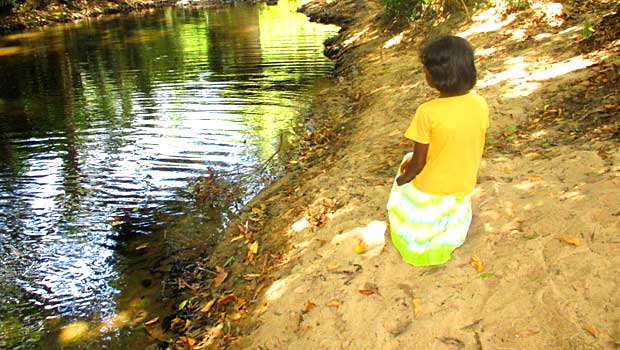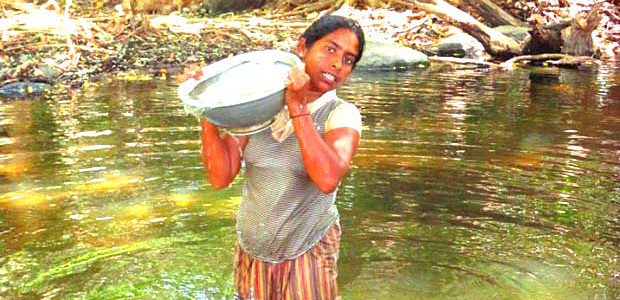Dive To Survive:
Meeting The Only Female Sand Miner On The Mukunu Oya
Sand mining by hand, a tough and physically demanding job, is mostly done by men. Yet Senevirathnage Pathma, a woman from Anuradhapura, has joined them.
In Sri Lanka, the demand for sand to be used on construction sites, has typically been fulfilled by sand mining, the removal of sand from beaches or riverbanks. For hundreds of years it was mined mainly. In recent years some of this work has become mechanized but a lot of it is still done by hand. Manual labourers dig up sand and, carry it in buckets or baskets to load onto trucks or, in some cases, barges. And it’s far from easy work. Nor is it very well paid.
It is also mostly done by men. Which makes Senevirathnage Pathma somewhat unusual. She is one of the many Sri Lankans who toil at sand mining. As a woman, she is a rarity among the sand miners at this river, the Mukunu Oya, a river flowing near the village of Indigha Potana in the Anuradhapura district. Almost all of the sand miners are men and Pathma is the only woman doing the job in this location.
Pathma’s work takes place in the river near her home. She must dive down to the riverbed, holding a large earthen pot. She collects the sand and brings it back to the river bank while her daughter sits, playing on top of the collected hillock of sand.
/
Above: Pathma’s daughter waits for her on the riverbank.
The job is hard, Pathma says, but she says she can deal with it in order that her two children are able to eat. It is physically tough and sand miners are known to deal with many illnesses. It can also be dangerous.
To fill one tractor of sand Pathma must dive around one hundred times. It takes her longer to fill a tractor – for which she is paid LKR1,500 (EUR8) – because the best spots along the river to collect sand have been reserved by male sand miners. There’s a lot of rocks here and tree roots and other debris which means Pathma has difficulty collecting much sand in one dive.
How did she end up here? “My husband used to work in the paddy fields, he made bricks and he collected sand as well,” Pathma explains. “He never asked for any help when he was collecting sand. That was even though he was in a lot of pain.”
Pathma’s husband eventually died of kidney failure.
“Myself and our children were left alone and I became the sole bread winner,” she says, her voice trembling at the memory. “We only have two meals a day and sometimes we have to be content with just one. I spend money from social welfare – about LKR2,000 – on rice and the money from the sand goes on other expenses.”
Pathma’s house is small and ramshackle, located in the forest next to the mostly deserted village. She lives there with her son and daughter, who both go to local schools, and her only possessions include two or three plastic chairs, some clay pots and faded garments.
The main beam of the roof in the house has broken but Pathma has managed to tie broken rafters with rope. “I don’t know when this will fall on us,” she says. She also worries about the wild elephants roaming in this area that cause all the locals to stay indoors at night.
“I spend every night with butterflies in my stomach,” she says.










